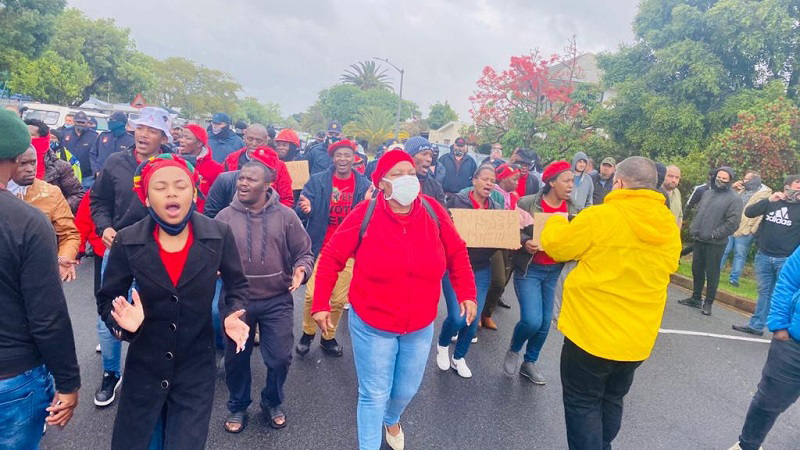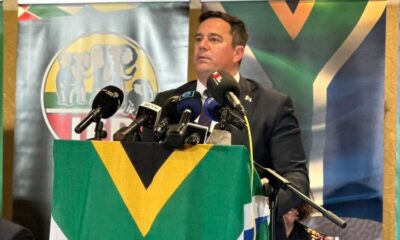
Featured Item

DA comparison of EFF to Nazi brownshirts causes storm
As the Economic Freedom Fighters (EFF) clashed with the public outside Brackenfell High School in the Western Cape on 9 November, Western Cape Democratic Alliance (DA) leader Bonginkosi Madikizela issued a statement condemning “the ongoing threatening attempts by the EFF to bend society to its will”. He then added, “The Nazis had the brownshirts that went around terrorising minorities. South Africa has the red shirts.”
The EFF was protesting against white students and parents having hosted a private matric dance after the school’s event was cancelled due to COVID-19, to which it said black learners or parents weren’t invited.
The matter escalated, with the school applying for an interdict to stop the EFF protesting outside its gates, and the South African Human Rights Commission condemning the violence and the holding of a “whites only” event. President Cyril Ramaphosa described the confrontation as “deeply regrettable”, and called on all parties involved to act responsibly.
However, South Africans took the DA to task for comparing the EFF to the Nazis, especially on the anniversary of Kristallnacht. “This is a horrific analogy to make on the anniversary of Kristallnacht and a blatant misrepresentation of what happened in Brackenfell today,” University of Pretoria political science lecturer Dr Sithembile Mbete wrote.
Southern Africa correspondent at the Financial Times, Joseph Cotterill, responded to the DA’s tweets, “On the anniversary of Kristallnacht no less. For South Africa’s main opposition party to cheapen the memory of Nazi persecution like this does show how far into the political wilderness it has gone.”
Some users responded with an image of an Instagram post where Brackenfell High School supposedly expressed admiration for Hitler. However, the chairperson of the school’s governing body, Guillaume Smit, confirmed to the SA Jewish Report that this was posted by a fake account in 2016 that was subsequently shut down when the person responsible was disciplined. “We find it abhorrent. It’s not what we stand for,” he said.
Professor Emeritus of History at the University of Cape Town and antisemitism expert, Milton Shain, says, “Comparing party-political actions to those of the Nazis is common in political contestation. We know that the EFF has long been associated with fascist thuggery – rightly or wrongly. The DA was presumably relating to this long-held analysis. The EFF aren’t Nazis, but they show signs of fascist-like behaviour.”
Shain explored this in an article in 2018, where he wrote amongst other points that Julius Malema and the EFF share much with the fascists of the previous century. “A muscular and integral nationalism, a sense of racial exclusivity, a commitment to destroy political enemies, a wish to reorganise the economy, an authoritarian leadership, and at least a hint of militarism. Even the EFF’s penchant for uniforms harks back to the brownshirts of Hitler’s Germany and the blackshirts of Mussolini’s Italy, as does Malema’s redemptive and at times racist rhetoric.
But he also noted that “Malema operates in a very different context. Unlike the original fascists, those he appeals to aren’t anxious about modernity or fearful of the left. His concern is historical injustice. More than that, he is comfortable with existing state institutions, appreciates nonviolent parliamentary methods, and welcomes judicial independence, a free press, and free elections. There is, then, much about Malema that isn’t fascist. He slots far better into the category of racial nationalist with populist leanings.”
Mary Kluk, the national president of the South African Jewish Board of Deputies and the director of the Durban Holocaust & Genocide Centre, said, “It has become increasingly commonplace for Nazi comparisons to be made in just about any situation. This is problematic. The Nazi regime was an exceptionally evil tyranny that went on to perpetrate some of the worst atrocities in human history.
“To make casual, knee-jerk comparisons with Nazism is therefore flippant and insensitive. It both grossly exaggerates regarding the target of the criticism, while at the same time diminishes the gravity of Nazi crimes. It’s all too easy to forget that there are many people alive today, including Holocaust survivors, who experienced Nazi savagery at first hand. Leaders in particular should be careful to avoid emotive rhetoric and misleading overstatements that serve only to enflame and polarise. The SAJBD will be seeking a meeting with the DA to discuss this matter.”
But Madikizela told the SA Jewish Report he wasn’t using the term “brownshirts” flippantly – he has thought about it, and believes it fits the EFF’s behaviour. “In fact the exact same thing was said by Gwede Mantashe in 2014.” At the time, the African National Congress’ secretary-general said: “[Adolf] Hitler used brownshirts to mobilise people. The danger of it is that once it catches fire, anarchy and destruction becomes a trend in the country. Its signs are worrying because similar trends have developed in history,” among other points.
Eleven months ago, political economist Ismail Lagardien wrote in Daily Maverick, “At the outset, Nazi expansion [according to Hitler] was to be achieved ‘through the unification of all Germanic peoples’. This has distinct echoes of Julius Malema’s stated objective to unify all Africans in something akin to an African Reich, and wage a war against scapegoats. Hitler started with the Jews as scapegoats. In the EFF’s case whites, Indians, and ‘non-Africans’ in general are Malema’s scapegoats.
“Throwing the term fascism around as easily as we do has the dangerous effect of reducing it to an almost meaningless term. The danger of this is that when actual fascism rises, or there are groups that display actual fascist tendencies, the term may already have become meaningless, and the villains are ignored or dismissed as buffoons, when they are, actually, a danger to society. Malema’s vision has the hallmark of an element of last century’s fascism that would be foolish to ignore,” he wrote in an in-depth analysis.
Said Madikizela, “I stand by my statement. Malema is behaving like Hitler, a comparison that has been made many times before. He’s been making statements that stoke violence against minorities in South Africa, and he even spoke about killing whites. He blames Jews, among other people, for the violence in Senekal. It’s not just in Brackenfell, it’s their behaviour in general when they protest, as we have seen in many instances. You can’t use the words ‘peaceful’ and ‘EFF’ in the same sentence.”
The EFF didn’t respond to the SA Jewish Report’s request for comment.










